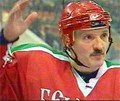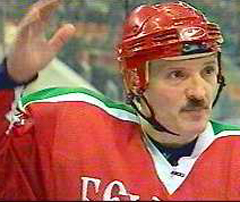EOC honours Europe's last dictator

11.12.2008
By Stine Alvad |
| Photo (c) of BBCNews |
The European Olympic Committee has honoured the man known as Europe’s last dictator, Belarusian President Alexander Lukashenko, with an award “For Outstanding Contribution to the Olympic Movement”. Critics argue that sport is just one of his propaganda tools.
The choice of Lukashenko was made by the EOC executives but raises questions within the EOC because of Belarus’ non-democratic reputation.
“It does not send the best signal about what the EOC stands for”, President of the Danish NOC, Nils Nygaard admits to Danish newspaper Politiken on awarding Lukashenko. “It is not very much in tune with the democratic traditions we seek to represent. It may seem a bit out of place”.
Belarus is regarded a nation that regularly fails to apply to the human rights standards. In their 2007 report, Reporters Sans Frontiers ranks Belarus in the bottom 20 when it comes to press freedom and last year Belarus was denied a seat in the United Nations Human Rights Council on grounds of violating Human Rights.
According to a UN resolution from 2007, the Belarusian violations include routine harassment and arrest of political and civil society activists, harassment and detention of journalists, enforced disappearance of opposition politicians and journalists, harassment and prosecution of human rights defenders and failure to hold free and fair elections.
In a press release issued by the Belarus Presidential Office, EOC President Patrick Hickey explains that Lukashenko received the award because he has led Belarus to a major breakthrough in the development of sport and Olympic movement and because of the achievement of Belarusian athletes at the Beijing Games, where Belarus was seventh among European countries in terms of medals.
Sport: a propaganda tool in Belarus
According to Vitali Silitski, Director of Belarusian Institute for Strategic Studies and PhD from Rutgers University, USA, sport and politics are closely related in Belarus.
Lukashenko is very fond of sports and he does do a lot to promote it and Belarus spends a great deal of money building good sporting facilities. Lukashenko often takes part in sporting events, both as a spectator and as a player on “all-star” teams. But according to Vitali Silitski, Lukashenko has a reason for doing this.
In an article from 2004, Silitski compares Lukashenko’s use of sports to “the Soviet-style sports propaganda.” Silitski argues that Lukashenko has created a myth of Belarus being a sports superpower and has turned sport into a national culture of which he is the representative and he uses the great attention sport has to send out his political messages.
“The emphasis on sport serves another purpose as well. In a country with so antagonistic a political culture, in a society so deeply split between those who support and those who oppose the president, sport is the easiest way to find a common denominator and to appeal to the whole of Belarusian society”, Silitski writes.
According to Jens Sejer Andersen, director of Play the Game, the EOC ought to take these things into consideration when handing out awards.
“It is deeply problematic that Europe’s last dictator can adorn himself with an award from a prestigious sports organisation that claims to represent fairness, social progress and distinction”, he says.
“For sports lovers, it is utterly embarrassing that the EOC chooses such an unscrupulous and brutal figure for an award. How can Olympic leaders say that they “celebrate humanity” while praising the most inhuman of European heads of state?
It may be out of endless naivety or it may be conscious demonstration of the true political affinity of the EOC. It is hard to say which is worst.”
Related links:
- Reporters sans frontiers report
- Olypian Ideals?, Article by Vitali Silitsky, published on www. tol.cz
- UN: 'no' to Belarus on Rights Council, Human Rights Watch
- Press release from Belarus on the EOC award
- UN resolution on Belarus





